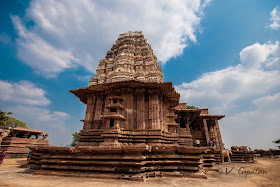If you travel 75 KMs from Warangal you will reach Palampet Village where you can find the spectacular 13th century Ramappa Temple. This medieval temple was built for Lord Shiva by Recharla Rudra Senani of the Kakatiya Dynasty. The Ramappa temple earns its name from its chief architect – Ramappa. Normally in India a temple is named after the presiding deity; the exception being the modern temples built by Birlas - all of which are called Birla Temple!

They say it took 40 years to build this temple and I can fully believe it considering the splendid sculptures of this temple and the technology that were available with them eight hundred years back!

The most striking feature of this temple is the figure brackets springing from the shoulders of the outer pillars supporting the eaves slabs. These figures are made of black stones with smooth finish. It looks very different and beautiful as the main temple is built with stones of light brown color.



The sculptures on the ceiling depict episodes from the Ramayana and the Mahabharata. Luckily as they are on the ceiling these sculptures are relatively intact and not damaged much! The delicate carvings of this temple are made on jet-black, fine-grained, dolerite rock. Intricate carvings also line the walls and ceilings as well as the pillars of the structure.

The temple is constructed with stones brought to the site with the help of elephants. The elephant’s statues are sculptured on the wall around the temple, all of them facing in one direction which shows the way to the temple entrance.


I am told that The Kakatiya Heritage Trust is lobbying to have this temple as well as the Thousand Pillar Temple and Warangal Fort, some 70 km southwest, declared as UNESCO World Heritage site.

This temple has sustained much damage due to war, time and even an earthquake! Today it stands as evidence to numerous invasions on Kakatiya Kingdom and one could see the vandalism caused by the invaders!

There is a striking similarity between the sculptures of this temple and the one in Belur built by Hoysala dynasty. The style of architecture the black stones used and the pillars all reminded me of Belur Chennakesava temple. Probably the builders of this temple drew inspiration from Belur Chennakesava temple as this one was built almost 100 years after Belur!
Now this temple is under the care of Archeological survey of India and so I am sure what is remaining in this temple will be preserved for the future!

Thanks for this blog. Would definitely visit one day!
ReplyDeleteThanks Sir for the detailed note on ^The Temple that is named after it's architect^- The Rammappa temple 🥰🥰🥰
ReplyDeleteYes there’s great similarity in the stones used and the style of sculpture seen at Belur and Halebedu Temples and the Ramada Temple sculptures
ReplyDelete